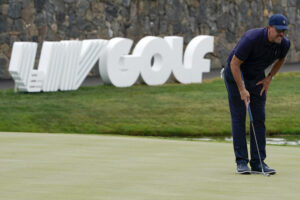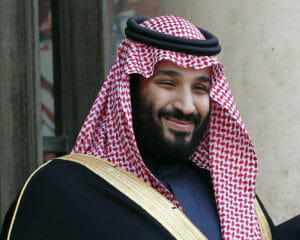For First Time, Women Are Allowed Into a Saudi Sports Stadium
A soccer match takes on a historic dimension for rights in Saudi Arabia. The female spectators, however, are segregated in the "family section."RIYADH, Saudi Arabia—Saudi women were allowed into a sports stadium for the first time Friday to watch a soccer match between two local teams — though they were segregated in the stands from the male-only crowd with designated seating in the so-called “family section.”
The move was the first of Saudi Arabia’s social reforms planned for this year to ease restrictions on women, spearheaded by the kingdom’s 32-year-old crown prince. The kingdom has also announced that starting in June women will be allowed to drive, lifting the world’s only ban on female drivers.
More than just an incremental step toward greater rights, the presence of women in the sports stadium underscored a wider effort to integrate women in society and grant them more public visibility in a country where gender segregation is widely enforced and where most women cover their faces and hair with black veils and don loose-flowing black robes, known as abayas.
The first stadium to open its doors to women was in the Red Sea city of Jiddah. The stadium in the capital, Riyadh, will open to women on Saturday, followed by the western city of Dammam on Thursday.
At the Jiddah stadium Friday, young Saudi women wearing bright orange vests over their abayas were deployed to help with the female crowds. “Welcome to Saudi families,” read a sign in Arabic erected across the section of the stadium reserved for women.
“It’s very festive and very well organized. A lot of people are just really happy to be here. I think there’s a lot of excitement when you walked in, especially among the children,” said Sarah Swick of the match between Saudi soccer teams Al-Ahli and Al-Batin.
To prepare for the change, the kingdom designated so-called “family sections” in the stands for women, separated by barriers from the male-only crowds. The stadiums were also fitted with female prayer areas and restrooms, as well as separate entrances and parking lots for female spectators. Local media said women would also have their own designated smoking areas.
“Family sections” are ubiquitous across the kingdom, allowing married couples, direct relatives and sometimes groups of friends to sit together, isolated from male-only tables at restaurants and in waiting areas at banks and hospitals. The sections also include women out on their own or in groups with other women.
Although only 20 riyals ($5.33) a ticket, the family section for Friday’s match was still less than half full.
“A lot of people wanted to wait and see how it is. Some thought it wouldn’t be very safe or organized,” said Swick, who attended the game with her Saudi husband and son, and her American mother.
Swick, who grew up in Maryland and has been living in Saudi Arabia for the past nine years, has attended football games in the U.S. and soccer matches in France, but said she was impressed with how organized Friday night’s match was.
“I definitely think we will come back,” she said.
An Arabic hashtag on Twitter about women entering stadiums garnered tens of thousands of tweets on Friday, with some using the hashtag to share photos of female spectators wearing their team’s colors in scarves thrown over their black abayas.
While many welcomed the decision to allow women into stadiums, others spoke out against it.
Some used the hashtag to write that women’s place should be in the home, focusing on their children and preserving their faith, and not at a stadium where male crowds frequently curse and chant raucously.
Saudi Arabia’s Crown Prince Mohammed bin Salman is seen as the driving force behind the loosened restrictions on women. Still in place, however, are guardianship laws that prevent women from traveling abroad, obtaining a passport or marrying without a male relative’s consent.
Set to inherit a country where more than half the population is under 25 years old and hungry for change, the young crown prince has looked to boost his popularity by curbing nearly four decades of deeply entrenched ultraconservative influence. His reforms, which include allowing movie theaters to open in March after a more than 35-year ban, are also aimed at creating more jobs and increasing local spending on entertainment as the country faces several more years of budget deficit amid continued lower oil prices.
The country’s large, new stadiums were built with hundreds of millions of dollars when oil prices were nearly double what they are now. The government spent lavishly on them in an effort to appease young Saudis and provide spaces for fans eager to cheer on local clubs, as well as hold national parades and ceremonies.
In a one-off, the stadium in Riyadh allowed families to enter and watch National Day festivities in September — marking the first time women had set foot inside.
In 2015, a Saudi woman who tried to attend a soccer game in Jiddah was arrested after local media said she was spotted by security officers “deliberately disguised” in pants, a long-sleeve top, a hat and sunglasses to avoid detection.
Over the years, though, there have been some exceptions for foreign women.
In 2015, an Australian female supporter of Western Sydney Wanderers soccer club was permitted to attend a match at Riyadh’s main stadium and a group of American women traveling with a U.S. Congress delegation also watched a local club match there.
___
Batrawy reported from Dubai, United Arab Emirates.
Your support matters…Independent journalism is under threat and overshadowed by heavily funded mainstream media.
You can help level the playing field. Become a member.
Your tax-deductible contribution keeps us digging beneath the headlines to give you thought-provoking, investigative reporting and analysis that unearths what's really happening- without compromise.
Give today to support our courageous, independent journalists.





You need to be a supporter to comment.
There are currently no responses to this article.
Be the first to respond.